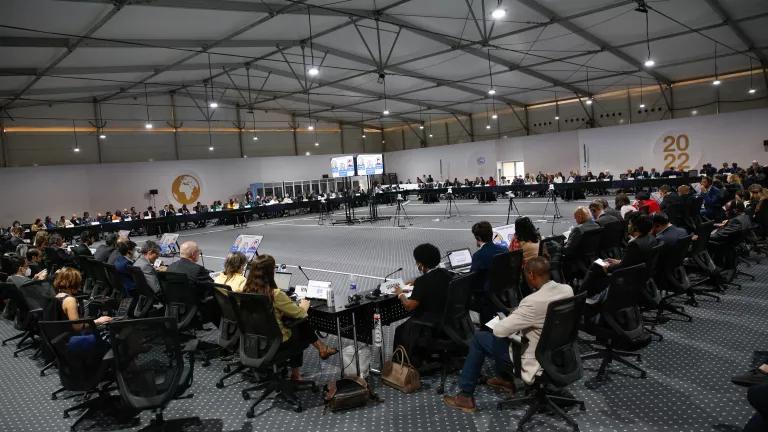Momentum Builds for Montreal Protocol to Be Big Climate Win
What if I told you the world could take one action this year that would shave off a half a degree Celsius of warming from our overheating planet? Would world leaders seize that opportunity and do everything in their power to leave their citizens a chance of a safer world with less devastating impacts from climate change? Leaders have a chance when they meet in Kigali, Rwanda next month to secure a phase-down of hydrofluorocarbons (HFCs) under the Montreal Protocol. Countries around the world have helped to create much stronger momentum for such an agreement with their new announcements at an event in New York today.
Here is what countries just announced.
105 countries send a clear signal that they want a strong agreement to significantly cut future HFC growth this year. Capable of avoiding warming of up to 0.5°C by 2100, an agreement on HFCs is critical to upholding the Paris Agreement’s ambition of limiting global temperature rise to 1.5°C. Countries are already converging on a phasedown schedule for developed countries, likely to start in 2019. The timing for the phasedown schedule of developing countries is under serious debate, with widely divergent proposals. The Africa Group, Pacific Island countries, leading Latin American and Caribbean countries, the U.S., European Union, Japan, and other developed countries have the most ambitious proposal, with a freeze on HFC use for developing countries to begin in 2021. India, seeking to continue HFC growth for another 15 years, is proposing a freeze in 2031. The 10-year gap between leading and lagging proposals makes a major environmental difference: waiting for the developing countries to freeze in 2031, would allow at least 33 billion extra CO2-eq tons of HFC use—equal to world’s CO2 output for an entire year.
With this statement, 105 countries have sent a powerful signal that they want an agreement this year under the Montreal Protocol that: “includes an early first reduction step for non-Article 5 parties [developed countries], an early freeze date for Article 5 parties [developing countries], and an ambitious phasedown schedule for all parties”. The countries in support of this statement are a diverse group: the major developed countries (such as the U.S., European Union, and Japan), leading developing countries (such as Argentina, Mexico, South Korea, Colombia, Chile, and Uruguay), and some of the most vulnerable countries in the world (such as all of the Africa Group and all of the Pacific Island nations). Will any country want to stand against this diverse group of countries including some of the most vulnerable to the impacts of climate change?
Developed countries put forward significant money to aid countries in making the urgent transition. The developed countries have signaled that are prepared to adopt a Montreal Protocol agreement where they mobilize significant finance to assist developing countries in making the transition towards coolants that have less of an impact on the climate system. This is the proven recipe of the Montreal Protocol, where developed countries have successfully contributed billions of dollars to the Multilateral Fund (MLF) of the Montreal Protocol.
To help start that transition early, major governments and private foundations have promised $80 million in new “prompt start” funding to assist developing countries. Leading developed countries have pledged $27 million for investments next year to the MLF “if an ambitious HFC amendment is adopted at the October 2016 Meeting of the Parties with a sufficiently early freeze date for Article 5 parties [developing countries] to warrant fast-start support for implementation”. On top of that 19 philanthropists announced their intent to provide $53 million to developing countries to support improvements in energy efficiency, including those that can occur when companies phase-down HFCs. This new funding will help developing countries make early transitions and take advantage of the energy efficiency savings by an early transition. Studies have shown that the energy efficiency benefits enabled by a smart HFC phase-down could provide significant climate benefits. For example, for a large country like India, a switch to lower-global warming potential (GWP) room ACs with energy efficiency improvements could offer a 15% energy savings over a business-as-usual.
It is critical that developed countries mobilize additional finance to help developing countries with the transition that will occur with aggressive phase-down schedules that will hopefully be agreed next month. Developing countries should insist on this as a part of the final Montreal Protocol agreement.
Major companies and subnational governments show their support for an aggressive Montreal Protocol agreement. More than 500 major global companies and associations outlined that they want an aggressive phase-down of HFCs this year. This includes such name brand companies as Aveda, Ben & Jerry’s, The Chemours Company, Daikin, Dell, Environmental Entrepreneurs (E2), Gap, General Mills, Godrej Group, Hewlett Packard Enterprise, Honeywell, Ingersoll Rand, Johnson Controls, Microsoft, Nike, Red Bull, Unilever, and many more. These companies are showing that they are fully behind efforts to secure the biggest climate win this year and put the world on a safer trajectory to achieve the climate targets agreed to in the Paris Agreement. The announcement includes over 100 state, provincial, and city leaders from around the world. As the statement says: “we declare our intent to work to reduce the use and emissions of high-global-warming-potential HFCs and transition over time to more sustainable alternatives in a manner that maintains or increases energy efficiency”.
-------------------------
Following on the heels of the successful Paris Agreement, a strong HFC phasedown amendment under the Montreal Protocol could show which leaders want to be on the right side of history. The announcements by over 100 companies, major funders, and key companies helps to build momentum to achieve a Montreal Protocol agreement this year that will leave a safer future for our children and grandchildren.
Let’s hope all countries rise to the top and secure an agreement worthy of praise.




